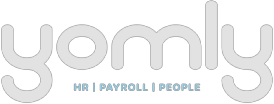How To Improve Workplace Diversity & Inclusion
Knowing how to increase workplace diversity in a way that benefits the company is a direct route to fostering a more dynamic and resilient business environment. Workplace diversity and inclusion bring varied perspectives to the table, enhancing creativity and decision-making. This diversity of thought is key to solving complex problems and innovating. Companies looking to thrive in the competitive landscape need to adopt strategies that welcome and nurture this variety of backgrounds and experiences. This article outlines straightforward approaches to enriching workplace diversity and inclusion, with Yomly providing the necessary tools for this endeavour through its HR and payroll software solutions.

Practical Steps for Broadening Diversity
Beginning with recruitment, widening the scope to include diverse talent pools is a straightforward strategy. This can be achieved by partnering with a variety of recruitment agencies, offering internships to candidates from diverse backgrounds and employing inclusive language in job postings. Additionally, transparency in promotion and pay scales reassures all employees of fair treatment, directly impacting the retention of a diverse workforce. Below are some additional steps to improve and broaden the scope of diversity in the workplace.
- Adopt Flexible Working Practices: Accommodate different lifestyles and responsibilities, such as childcare or religious commitments, to support a wider range of employees.
- Regularly Review Diversity Policies: Ensure policies are up-to-date and reflect current best practices in promoting diversity and inclusion within the workplace.
- Celebrate Cultural Events: Recognize and celebrate a variety of cultural and religious events, increasing awareness and appreciation of different traditions among employees.
- Encourage Mentorship Programs: Pair employees from diverse backgrounds with mentors who can offer guidance, support and opportunities for professional development.
- Solicit Feedback on Inclusion Efforts: Regularly gather and act on feedback from employees regarding the effectiveness of diversity and inclusion initiatives, ensuring that efforts are responsive and impactful.
The Role of HR Systems in Promoting Inclusion
Modern HR systems offer functionalities that reduce biases in recruitment processes and performance evaluations. By employing algorithms that focus on skills and experience over personal details, these systems ensure a fairer selection process. The benefits of cloud-based HR systems also include easier access to training resources and company policies for all employees, promoting a culture of learning and equal opportunity. Yomly’s employee performance management solutions are designed to support these initiatives, making them more accessible to businesses.
Creating a Learning Environment
A workplace that values learning is naturally inclined towards inclusion. Providing training that addresses unconscious bias and promotes cultural awareness is beneficial. Such efforts show a company’s commitment to a respectful and supportive work environment. Moreover, encouraging employees to share their cultural experiences and professional knowledge enhances mutual understanding and teamwork.
A Future-Oriented Approach to Diversity and Inclusion
By focusing on practical and actionable strategies, companies can significantly enhance their workplace diversity and inclusion. This effort not only contributes to a more harmonious work environment but also to the bottom line. With the support of Yomly’s HR and payroll solutions, organisations have the tools at their disposal to make meaningful progress in this area.
Request a FREE product tour of our software today!
Why is diversity important?
- Diversity introduces a wealth of perspectives, fostering innovation and creativity within an organisation. It enables teams to approach problems from various angles, leading to more comprehensive and effective solutions. Additionally, diversity reflects the global marketplace, helping companies better understand and serve their diverse customer bases.
What is workplace discrimination?
- Workplace discrimination involves unfair treatment of employees or job applicants based on personal attributes such as race, gender, age, religion, or disability. This can manifest in hiring practices, promotion decisions, job assignments, and daily interactions, undermining the principles of equality and respect. Discrimination not only affects individual well-being but also diminishes team cohesion and productivity.
What are the benefits of a diverse workforce?
- A diverse workforce drives business growth by combining different skills, experiences and viewpoints. It enhances problem-solving capabilities and sparks innovation, enabling companies to adapt more swiftly to market changes. Furthermore, a diverse team can improve customer insights and satisfaction by relating to a wider range of consumer needs and preferences.
